
We love artists at The Wild Word.
Our Artist-in-Residence page provides a space for artists to showcase their work and to spread their creative wings. In their month of residency, invited artists are encouraged to collaborate with other contributors within the magazine, to experiment and develop new projects, while giving us an insight into their creative process.
Our ALL FOR ONE Artist-in-Residence is the poet Hiram Larew.

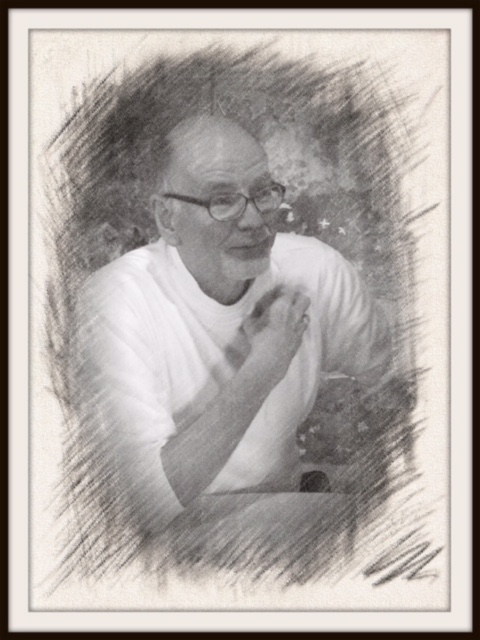
Hiram Larew is in wicked love with poetry. His work has appeared in journals and collections, most recently, Amsterdam Quarterly, vox poetica, Honest Ulsterman, Little Patuxent Review, FORTH, Viator and Every Day Poems. Nominated for four Pushcarts, he organizes poetry events, activities and conclaves that showcase wide poetic diversity and insights. A global food security specialist by training, he lives in Maryland, USA. See his page on Facebook.
All for One
What commons us to rally? What pulls our many strings together? What’s me that’s also you? All for One is a call, a rouse, a deep instinct to lend a hand and heart. It also conveys time; it spotlights the spirit of our forebears as they struggled alone and together to move ahead. And, it implies that we are more when arm-in-arm than when standing alone. Its neighbor—and One for All—echoes this power of offering up, of joining in, and of seeking oneself in the collective.
So, how does an All for One approach in poetry call us? For me, the notion of shoulder-to-shoulder speaks directly to the amazing influence we have on each other as poets. How your work shapes mine. And, how time doesn’t matter at all—we stand alongside and are so remarkably shaped by all of those who have gone before.
What do you think? How does All for One beckon you?
If it helps, here’s are a couple of prompting questions—What would a poem that begins with you alone but ends with an All for One point of view contain in its middle? Or, can you imagine a cause, a challenge, a wonderful joy that needs our “one another?” If so, write it.
My thanks to The Wild Word Founder and Editor, Kusi Okamura, for this chance to serve as an online Artist in Residence. Over the coming month, I hope to learn from readers like you about the theme of All for One, your current imagination, and how The Wild Word site helps. I also hope to write some new things with both my thoughts and yours in mind—and to share rough drafts that may result.
Most important of all, I hope we journey for a little way together. And, that we take the chance to reckon, to enjoy some brights and some news. And that we grin—most of all, that we grin.
Thanks,
Hiram Larew
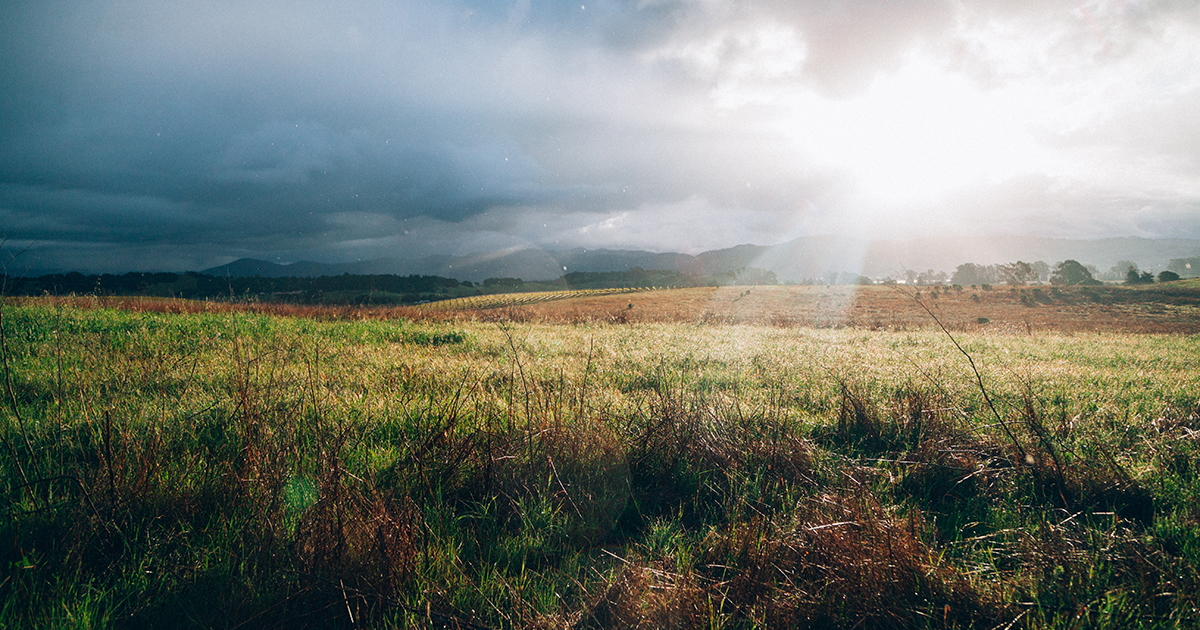
LIFE WITH A CANDLE
I want to marry this field
Truly and simply
With its wings curving the corners
And its smoothness stunning my knees
All of my heart is here far around me
And there’s humming and leaning –
Even the trifling breeze
I want this field for my living
To vow to its edges
That nothing comes true
Without greening
Nothing seems as bold as my longings
Except sloping
Nothing wakes on my shoulder
But rustling
I hope the strangest hopes in this field
Ever bending
From here
I know that this much of my all is clear –
Before there were hills
Or even eyes to up over
There was a distance beyond us
A long far away that can never come near
There was wishing
I want to carry this field
In my arms
By its being
To a maybe that’s certain
So our future can flicker on grasses
And our children will wave from the clouds.
This poem first appeared in Innisfree.
CUFF
The last thing I was was bad
And the next thing I’ll be is worse
I’m foregone and predestined
Like rusted scissors
So it doesn’t matter if start stops
Or girls boy
I’m natively wrong
And my punishment is
To have a string run from
My mouth up to the very sky
So that I have no secrets at all and
So that I really do know better
My idea of perfect is confusion –
Flies finding a carcass
Lips trying to yell under water
Or gravity crazy mad at its equal
I like messes
And whatever throws a fit
I like mud even up on the ceiling
As I’ve said
Just give me one good reason
Why I shouldn’t enjoy fumes or snakes
Or anything that’s out of control
Tell me why disaster shouldn’t be a friend
You see here’s what it really comes down to –
My dead is better than yours
And I’ll bet the whole stash on it
Even as all of the big brown cows
Go floating down by us
In the river.
This poem first appeared in Rhino.
BOY HOWDY
Modern life hurts me –
Would that I could die in the arms
Of seed catalogues
Or turn over in a bed and feel
Snow coming in the window
My father taught me to wave at life from
Cherished corners
His coat pockets were really my teenage years
Carry on is how I feel now –
So may these lines become as strikingly handsome
As hands on shoulders
May they cause strangers to look up again and again
May the hope in these lines age well like chewed pencils
Or turn into stale crumbs
That birds will fight over.
This poem first appeared in Broadkill Review.
BEST NOT

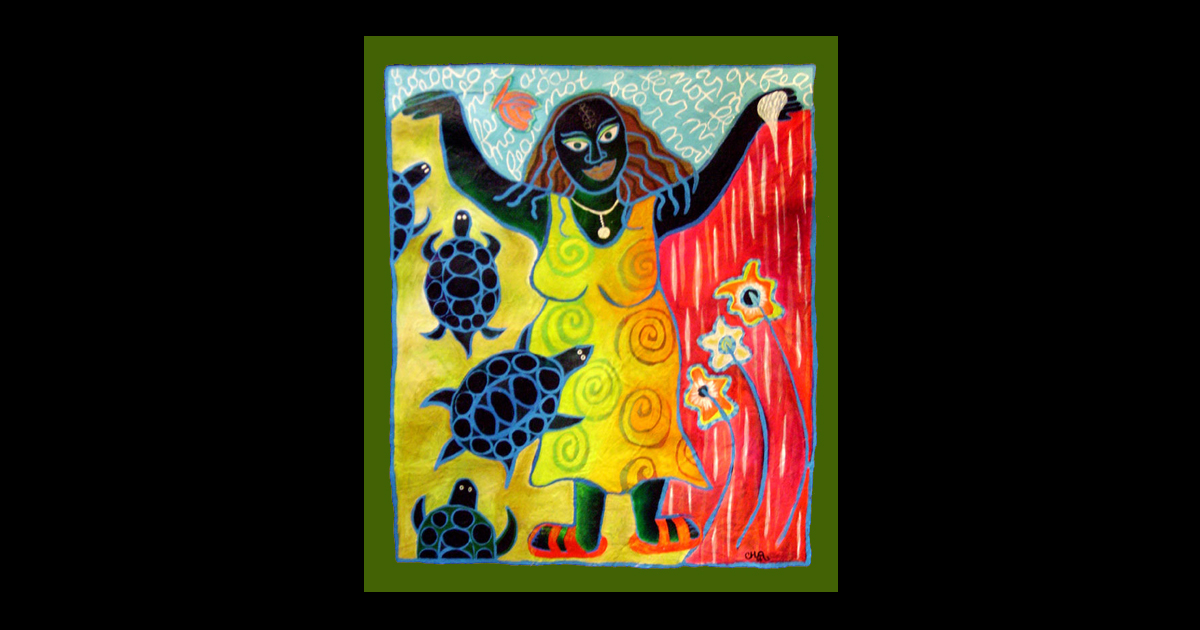
‘Artist Fear Not’ by Caryl Henry Alexander
Here’s to a second week of ALL FOR ONE! If you haven’t already, you may want to sit down with a friend, a coffee or a shady tree to enjoy this month’s issue of The Wild Word. The kaleidoscope of work that’s featured includes short essays by Maria Behan, Jami Ingledue, Annie Mark-Westfall, Irena Ioannou, James Prenatt, Tim Clark, Daniel Blokh and Rev. Rachel Kessler – all centered on our ALL FOR ONE role as citizens, friends, parents, writers/artists and neighbors. And then, there’s the showcased fiction by Thadd Simpson and Leif Ecklert – both pieces are especially consequential in challenging deep biases about living and loving. The poetry section is a box of chocolates, with a variety of pieces by Jeremy Nathan Marks (also presented as the vox poetica featured poet on July 24, 2017), Sergio Ortiz, Wendy Thornton and Devon Balwit – again, all with an eye towards the mysteries of the common cause.
In synch with the theme, I was recently given the gift of working with seven other poets who all glow with their commitment to the craft, their concern about these trying times and their trust in all energies, innovation and laughter that come from rubbing shoulders. So, to Nan Meneely, Sharon Olson, Carole Stasiowski, Gray Jacobik, Lawrence Wray, Ruth Foley and Anne Harding Woodworth, a “gratitudinous” grin from me for proving that the call of ALL FOR ONE is powerful and fun.
For this second week’s posting, Caryl Henry Alexander, a terrific artist with purpose and nearby friend, provided some of her images that evoke the spirit of ALL FOR ONE. Learn more about Caryl and her work at the following sites – carylhenryalexander.com, carylhenryalexander.blogspot.com or facebook.com/groups/Artistwithpurpose.
Over the coming week, I hope that you’ll share your thoughts on what ALL FOR ONE means to you. How does it sing to you – or not? What makes it hard to do? Why would you encourage young people towards it? How can we use our art to break down walls that separate us and prevent collective efforts?
Finally, with this second posting, I’m sharing a few more poems. Feel free to let me know if they are opaque or interesting, or if you have any other kinds of reactions? Thanks! Send feedback to HLAREW@gmail.com
WHAT HAPPENS NEXT
How can you look so such in profile?
How do you conjure up each and all
By nodding?
You provide every by-way with
The edges of wings.
How can you be years’ abound by simply turning to say
And not know it—
A going that’s never fully—
A sliver slice of ever?
How does this crowded room suddenly become
Such an of course in your silhouette?
And how does an arrow start from inside you?
Why are you this almost and that fleeting?
Most of all
Why is so fully
Just half?
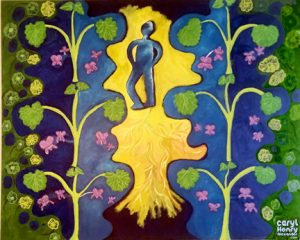
‘Meet My Friend, Creeping Alexander’ by Caryl Henry Alexander
LUTES
Shout alarmed, like when you see fire suddenly.
Shout as if you’re wild in pain.
Or, if you’re called up on stage, shout like that.
Just as much too, shout the way you would
Being a prisoner –
And again, the way you must have
When you first heard lutes.
Terribly shout because of being grabbed from behind.
Then, shout hard just before parents fade.
And of course, always whisper to anyone bending towards you.
Only shout, then above that, shout as soon as you feel wings.
This poem first appeared in Seminary Ridge Review.
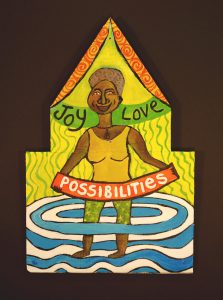
‘Possibilities, Joy and Love’ by Caryl Henry Alexander
WHAT WITCH
How many more sleeps before we kettle?
How much more salt over this stew?
Who are the onions, the gristle, the answers?
Follow the bubbles, follow the clues.
But what if our slurps get answered in poison?
And how do such spells turn into glue?
Why does the moon sly?
Why does pure joy cry?
Who’s making sure that all of this firewood
Gets split into two?
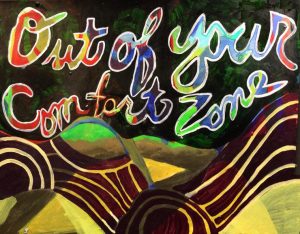
‘Out of Your Comfort Zone’ by Caryl Henry Alexander
HEAP
For the life of me
I can’t believe
How so much
Depends on glances or
For that matter
On giving up
But there it is –
Even all of history
And most of what’s to come
Is shaped by
Bending grasses and
Some morning’s chill
Above us
And all my plans are pauses
If I’ve been anything
I’ve been sloppy
With rules like puddles
And with love diced up for the ages
In fact said best
I’ve been an onion
And still resent deeply
What’s proven and known
Enough is enough
By the time you get this
The moon will have changed completely
I’ll be a ghost
And farmers
Wonders that they are
Will have started all over again
From scratch.
This poem first appeared in Connections.
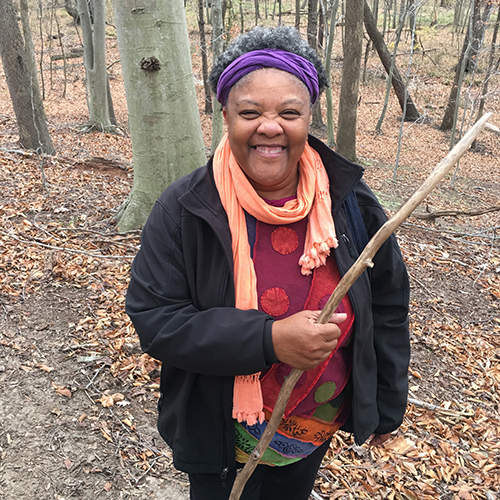
Caryl Henry Alexander is a visual artist whose passion is to create safe space in communities for people to unleash their imagination and creativity. She is a medicine woman who supports her co-creators to move energy in the service of their personal and collective wellbeing.
In the studio Caryl works as a painter, sculptor and mixed media artist. Most recently she has been following her love of nature, and gardening by integrating natural materials into her pieces.
Henry Alexander is also an educator, activist and a free range Unitarian Universalist. She is originally from Oakland California and currently lives in Maryland.

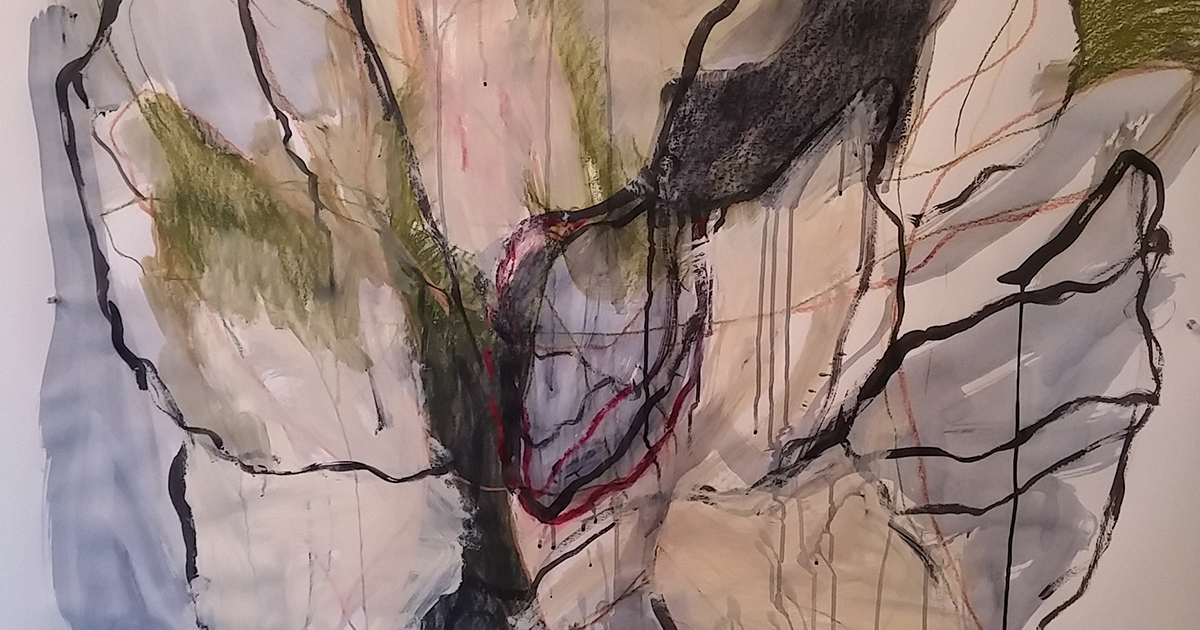
Detail from ‘Middle’, acrylic & ink on paper, 40×40″, 2017, by Karen Jelenfy
A third week’s venture! The concept of an online Artist-in-Residence is pretty enticing for the chance it provides to hold forth, to collaborate and to engage. It’s not the same, of course, as a writing retreat, a workshop, or a reading/conference.
An e-AIR is, in fact, a different kind of ticket. It’s a new way to travel along poetry. It’s a trail-blaze that hoots at the notion of anything anymore being “place-based,” that zooms across time zones like stars, but that is calmed down a little bit by the sequencing and pacing of weekly interactions. Said much better, an online residency is mighty exciting.
My friend from Maine, USA, Karen Jelenfy, is a wonder artist and poet. Her sharp/soft images captivate my very socks. I hope, in an ALL FOR ONE spirit, you’ll find them as moving as I do. Learn more about her at facebook.com/karen.jelenfy.
I’m excited to offer short notes here about why I worship poetry, and why I hope to someday become one of Emily’s dashes. Looking back, I will never ever forget how, as a kid, I suddenly grew five feet in one jump at first encounters with G. M. Hopkins’ “downdolphinry”, and another two when I saw as a teen Ferlinghetti’s Coney Island of the Mind performed on TV. The poems I wrote when younger were written by another me, not now me. Of course, the poems I write today are not much wiser, wider or further. But they are surely grounded in grateful, each one, for the incredible permissions that all poet wonders near and far have provided over the years. If ever I was, I just can’t imagine being fenced in ever again.
And then there’s this…Without knowing why and for as long as I can recall, I’ve always loved the taste of poetry—its greenest twigs, its frozen blossoms, its roots and snags, and all of its sweet rambunctions. Poetry has been—and will always be—my peaches. These days and times, I find needed solace, power and will in all the lifted voices—young and old, pink and green, loud and soft, up and down. The poetry of witness commands!
The Fates gave me big ears, the better to listen to poets read their work. So, here’s to readings, to recordings, podcasts, and webcasts. Here’s to performance poetry, slam poetry, glam poetry, goth poetry, rock poetry, gutz poetry, barn poetry, and your poetry. Here’s to the delightful variety of sadness and gladness that’s poetry. And, of course, here’s a hiccup of a toast to the poetry that in forever unknown ways changes even how our hair grows.
All For One,
Hiram
HLAREW@gmail.com
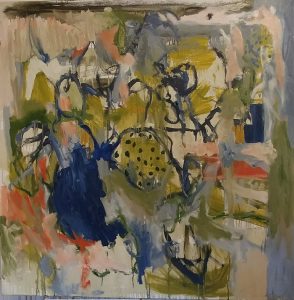
Texture of Things, oil on canvas, 42×42″, Karen Jelenfy
LOOK HERE
Sooner or later
Over some breakfast
We’ll realize what’s what
About our place in the world.
In fact if we’d only stare at milk more often
Or get treated by the wind
Now and then
Like loose leaves
We’d really see
And might even become that house out there
To itself
In the middle of flat way off land.
The best plans to make
Come from the spots we don’t get to—
They shimmer ahead
And act like a man about town.
Put simply
Whatever’s far away from us
Says exactly why we should be trying.
You see
Nothing is as sure as what’s combed back
Or rooster ready
And luck is never ever even.
CHIRP
Be be my through into be sky
Take as me this as beginning see
Once in keen light is your so ever I
When by alive my new else is—
How then to make us as we are like this
When where we must be such might seeds—
O see this is most by also try need
Say then above as all time is—
Be be as clear
Be be as near
Be be as here as the why is.
This poem first appeared in Every Day Poems.
ADVICE
A friend calls me who’s crying about a boyfriend
And I can’t say much to help because—
Because most of my time is quiet and I like flat land
Because I prefer pencils
Because I still don’t have a microwave
Because all of my aunts were unmarried
Because I wear sheets like sarongs
Because I’m stooped
Because I’ve never been really poor or quick
Because I’ve never learned to order pizza out
Because I think tone of voice is important
And because wherever I go I always pack a vase.
I can’t give much advice because
Those kinds of relationships
Are mysteries to me
Like sugar dissolving or cars that backfire.
This poem first appeared in The Evergreen Chronicles.
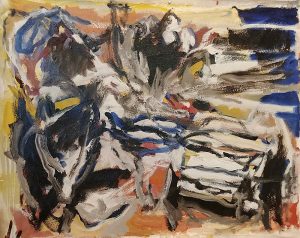
She Stopped By, oil on canvas, 36×40″, 2017, Karen Jelenfy
IF HE NEVER HEARS THIS
There’s no pattern to what disappears
Nothing to make sure that our ideas are everlasting
Or repeated
In fact we can’t predict what stays or lingers
Or leaves
It may be that wishing wells
Especially their walls
Know the secret of this yearning to endure
Somehow fireworks do too coming down
But mostly we know that everything we know
Is just water
And all we are is snaps
Never ask anyone anything directly
Be a swan’s neck
So that you find out everything by guessing
And for balance
Imagine loving someone so much that it feels like
You are opening the lid of a jar
And then going
The boring point is this
The best friend to make is chance—
Do whatever it takes
To wake up tangled in the arms of maybe
Start to trust what you’ve done
For as long as a blink
Mostly think like a windy corner.
This poem first appeared in the washington review.
GOLLY
I don’t know about you
But when a leafy branch comes in the window
I love it
Beyond common sense
In fact I love anything that’s where
It’s not supposed to be
And all the air around it
And what I live for more and more
Are the things that shouldn’t happen
My best friend is the uh oh sound
Everyone makes
When a glass breaks
And my hero is whispers
One of these days
What I hope to notice
Before anything else
(Even before eyes)
Is shoulders
Because just like hills
They make me guess
At what I’ll never know.
This poem first appeared in Facets.

Karen Jelenfy is a painter and writer currently living in mid-coast Maine, USA. Her paintings and drawings are direct responses to the forests and seacoasts around her home. Observation becomes squeezed and battered by memory; the tangled world takes on color. Nothing and no one is at rest.

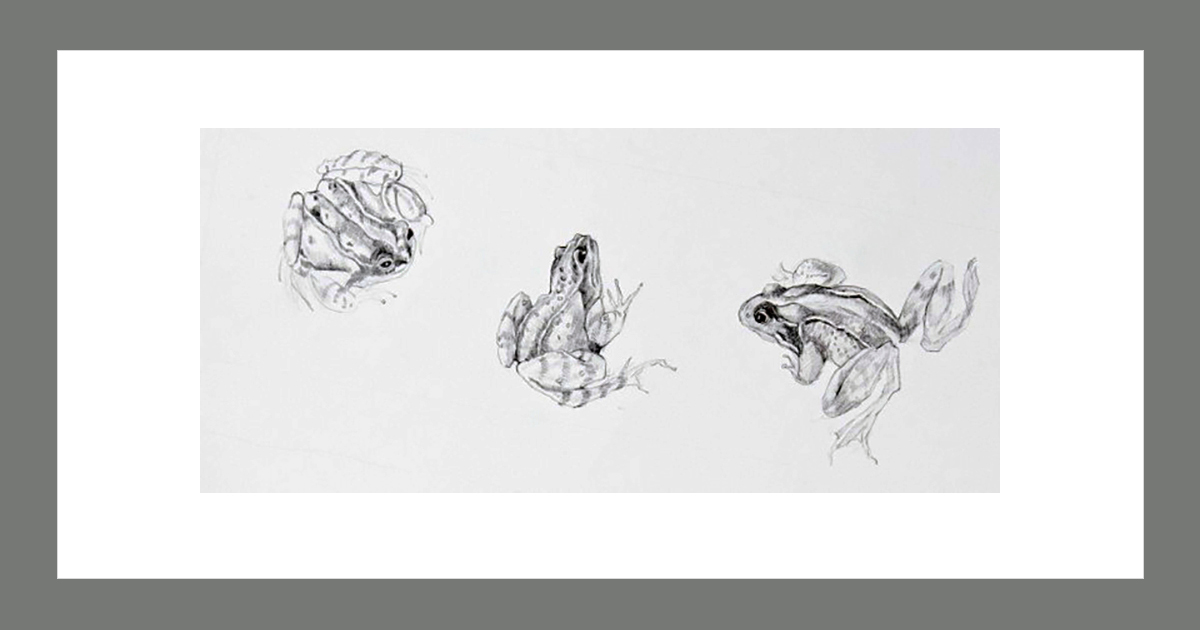
‘Frog Studies’ by Jane Broadwater Larew
As I pack up to finish The Wild Word’s Artist in Residency, with the theme of ALL FOR ONE, I’d like leave behind some questions about the wonders of poetry as a farewell.
But before the questions…This week’s posting features the artwork of my older sister, Jane Broadwater Larew. I’m biased, of course, but I’ve always enjoyed Jane’s joyous use of color and motion on her canvases, and am grateful to The Wild Word for showcasing some of her paintings/drawings. More info about her fine gallery of work is at janebroadwaterlarew.com.
The more I learn about poetry (and myself), the more jumbly the questions become. Here are just a few of the messier ones. What is your poetry? Never having been formally trained in the poetic arts, I’m always envious of those who have studied and read widely and, as a result, are able to assess or summarize, and observe or analyze the flight of a poem. I’m awed by anyone who can look up from a poem to describe its airborne magic. Instead, poems speak to the mystery, the unknown, the “not me” part of me. The poems that I love unconditionally are nearly total strangers in fog. But here’s the thing—they are also my truest of soul mates; I’d sacrifice just about anything for what they say by not saying, and how they say it. Said simply, poetry is my shadow.
So, from that vantage, I wonder about how poems grab. How do they reach out from the page and, as a friend recently pointed out, spark reactions before logic has a chance to kick in? Are poetry’s primals nearly religious in sway? Coming back down to Earth—how are ingredients such as surprise and strangeness or clarity and logic used to best effect in poetry? And, gosh, how can we best enjoy or at least respect the changes in temper, timbre, and tone that happen over the years as we continue to write poems?
On the current social front, there are surely questions of stovepipes, crosswalks and generally, inter-zones. Does, for example, the poetry of one generation, one culture, one gender, one life experience speak to—and can it be enriched by shoulder rubbing with—another? And does this new e-world of poetry shake down or build up walls?
Lastly, there’s the questions of evers. What makes for a poetry legacy? Will any of our lines be carved into granite? Which poems will jump into the future? Does the crammed crowdful of past and present poetry leave any space in the canon for new entrants?
As favorite teachers always say, there are no right or wrong answers. But, there are powerful reasons to ask why and how. So my ALL FOR ONE wish is that you always wonder—and wander—with poetry alongside.
Hiram Larew
HLAREW@gmail.com
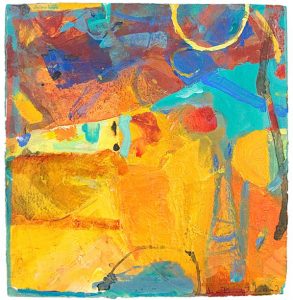
‘Bicycling Around Town’ by Jane Broadwater Larew
UNDONE
If I unteach my kiss or unwake my morning
And star the days that rise beyond
If I reach back to where the newness lives
And firsts flowed by
If I undo my done-ings
And near the point of dreaming
Get there and then come back to now
With any gathered loops or straw long gone
If I but ever.
If I return to us
And unteach my kiss or untime my shirt
Or unhum arrows
If I begin again all over
If I act like onions do in Autumn
And love surprise as if it plunked the surface
If I unteach my lips to dwell
And if all that or more becomes my taken for granted
If I unteach my kiss
If I unlearn my every now of you
To swim.
This poem first appeared in Poets & Artists.
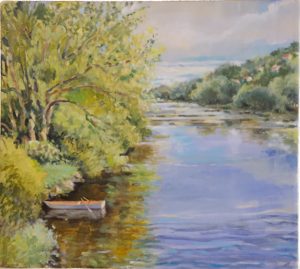
‘Blue Boat on the Naab’ by Jane Broadwater Larew
BON BON
I don’t have any idea what you’re talking about because
You’re all future
And I’m nearly dust.
You’re the weather that’s coming
And I’m back down the lane –
As if never-lasting or sparrows or gnats.
I’m wondering who will be beyonding and who will come back
Who is better who is flat
Who grabs hold of or who reaches out
Who is clearer but who is sprout
Who gets candy and who finds out?
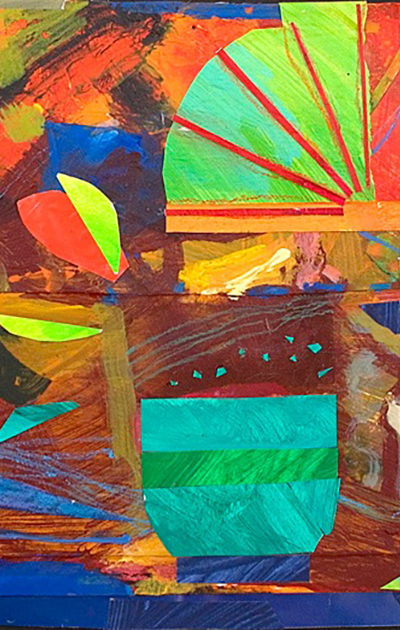
‘Haiku Afternoon’ by Jane Broadwater Larew
MY PIPING HEART
You will surely fly beyond me.
And as my age-wild landscape begins to fold
Into autumn’s full
Where forever hoots and my bonfires wander –
I’ll stay here in turned to.
Much of me time-scatters like leaves divinely.
And yes, how my wish-I-was-young suddenly sings.
Tell me again –
When will I be you beside me
Like decades?
You’re all of what was and will be –
Those full rounding edges,
These knees of my journey,
Such curlier rhymes.
What I am saying is that
You promise such onward
On wind or piping.
In your glance is the new motion of moons –
Remind me before I do
That I’m all of your off-handing.
And then but so –
Know my my of my wanting
That when you yourself turn some day also
You too will be barning like I am now –
Spying from loft beams
Longing down on harvests and scants
Asking how who became who
As I chance do
Now.
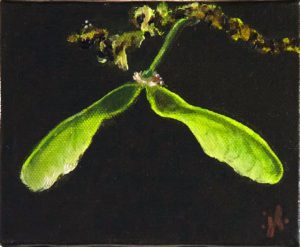
‘Samara’ by Jane Broadwater Larew
ONCE MAY
No one is better
Than the fence is ahead
That is only there because of rain –
The fence that opens onto long ago Springs remembered
Bending now with dripping buds
With all cupped sounds
From as far away as can be held –
No one is ever better
No one is dearer
Than yellows are in green
That you believe are warmer for the chill
That you discover in the smell of clouds
Or that you can trust as much as ever will
And that you love like gates of newborn grass –
No one is dearer
No one is ever closer
Than knowing this is home –
Feeling that you will be here after all –
A hillside –
And that to come this near for now
Is somehow as important as early evenings May –
No one comes closer.
This poem first appeared in Lummox 4.
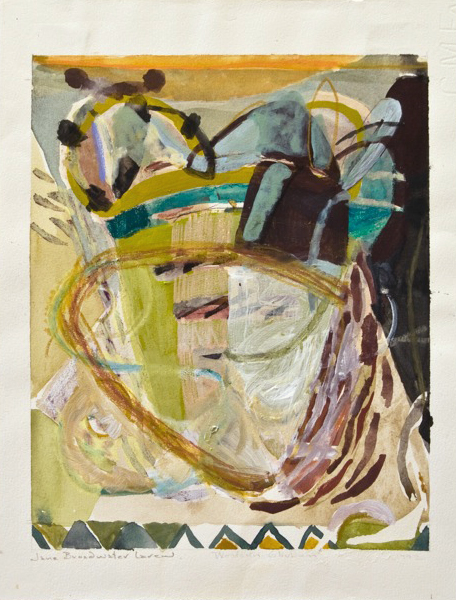
‘Presently Untitled’ by Jane Broadwater Larew
VIM
For just a split second the other day
The illness that will one day kill me
Came out looked around and laughed
Then just as quickly
Went back inside to where it came from –
Oh well
I know who I love do you
I know what’s rough or smooth
And how less fights more
(Think of ice at night)
I know that anything worthwhile depends
On repetition
So here’s a wish once again –
May the boats of such discoveries
Allow friends to swim alongside
May my wasted time redeem itself
By a doubling of the vines hanging down
And may at least one among all my stories
Get covered in sand.
This poem first appeared in Broadkill Review.
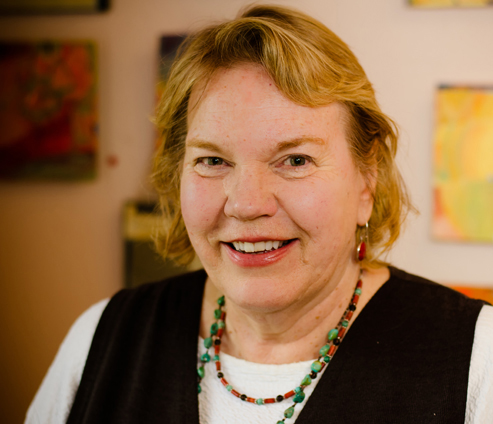
Jane Broadwater Larew has held artist residencies at Millay Colony, New York, USA; Virginia Center for the Creative Arts, Virginia, USA; Oberpfalzer Kunstlerhaus, Germany; and, Klenova Castle, Czech Republic. She lives and works in Charlottesville, Virginia, USA and Schwandorf, Germany.
ARTIST STATEMENT – JANE BROADWATER LAREW
As you can see, I do several different kinds of work. Like different kinds of music, some are more classical and some are more improvisational. Sometimes I like to spend a few hours outdoors drawing something in nature that catches my eye—a seed, a shell, an insect—just with pencil on paper, as carefully observed as I can. Sometimes I take my paint and a small canvas and ride my bicycle to a landscape or river view that I’m curious about. Sometimes it’s all about the richness of color, jaunty rhythms, and juxtaposition of shapes, and may be inspired by a poem, a song, an afternoon with a friend drinking tea, or walking across a field.


‘Distracted by Spiders’ by Karen Jelenfy
Our ALL FOR ONE Artist-in-Residence is poet Hiram Larew who, in another life, is also an agricultural scientist of some renown. The Wild Word talked with him about his two passions, his enduring love of poetry, and the magic of words.
IN CONVERSATION WITH HIRAM LAREW
There wasn’t a clear moment in my kidhood when I became interested in poetry, but I do remember being really taken by some poems that we read in grade school. One of my grandmothers also wrote poetry, and she lovingly shared some of her work with me. It’s hard to say what impact those early times had, but I think they did help shape my interests, or at least point me towards the poetry road.
I’ve written off and on all of my adulthood. But, my work in the science of global food security and hunger seems to be largely separate from my affair with poetry—two sides of my personality and brain. I’m keenly interested in the science and art of food security—and I’m continuing to work on these issues in my retirement. At the same time and on another track, I‘m pretty involved in enjoying poetry. But, here’s the thing…I think these two have somehow joined hands behind my back, without my consciously knowing it. They connive together in ways I can’t fathom.
I’ve never felt the two pursuits argued with each other or were conflicted. But, I’m also not sure if they co-inhabit any part of me. Maybe in my ears. It may be that both require that I listen much more than I would otherwise tend to do. In fact, for me, poetry is so dependent on listening and observing. And then, trying to come to terms with what’s been seen, or heard. And then, offering an interpretation back to a wished-for reader. My work in food security also is grounded in listening to causes, to cultures and to science.
One of the things I’ve been interested in of late is what I call “word shadows” in poetry. I’m not sure that I’ll be clear on this…but I notice that when I read a word, especially one that’s been spotlit in a poem, I not only see that word, but also often read, hear or imagine other words in its shadows – words that, through similar sound or meaning, echo the printed word. Shadows may be the result of shared rhythm, but they seem to happen more often when the sound of a word calls up another similar sounding word. They are just one more reason why I’m so deeply in love with the magic of poetry.
There is an openness to the world in my work, maybe even a curious resignation about what can, should and will be. I don’t think my poems provide many answers. Resolution is fun when it happens, but for me, resolution is usually diluted with more questions. Maybe that is a common thread stretching between “my two worlds” – poetry and food security.
My work on hunger around the world—including hunger here in the U.S.—has also made me realize how little I know about the incredibly diverse world of poetry. I just recently had a poem accepted by a Nigerian journal. Hopefully, as a result, I’ll learn more about Africa’s very active poetry scene.
What inspires me? Surprises. They are endlessly fascinating to me. And, while I rarely successfully capture them in my poems, I surely do try. The unexpected, the out of the ordinary, or especially, the all-at-onces that happen over a coffee or when riding the subway. These are what I live for, both in my poems and, I suppose, in my work on food security. Here’s an example of what I mean about surprises that leap into my poems: A while back, I noticed that I’d parked so closely to a shrub that one of its branches had popped into my car through the window. That surprised me, and led to a poem called, “Golly.”
GOLLY
I don’t know about you
But when a leafy branch comes in the window
I love it
Beyond common sense
In fact I love anything that’s where
It’s not supposed to be
And all the air around it
And what I live for more and more
Are the things that shouldn’t happen
My best friend is the uh oh sound
Everyone makes
When a glass breaks
And my hero is whispers
One of these days
What I hope to notice
Before anything else
(Even before eyes)
Is shoulders
Because just like hills
They make me guess
At what I’ll never know.
This poem first appeared in my collection, More than Anything.

Karen Jelenfy is a painter and writer currently living in mid-coast Maine, USA. Her paintings and drawings are direct responses to the forests and seacoasts around her home. Observation becomes squeezed and battered by memory; the tangled world takes on color. Nothing and no one is at rest.























